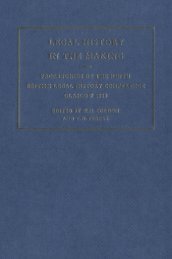130. - Collection Point® | The Total Digital Asset Management System
130. - Collection Point® | The Total Digital Asset Management System
130. - Collection Point® | The Total Digital Asset Management System
You also want an ePaper? Increase the reach of your titles
YUMPU automatically turns print PDFs into web optimized ePapers that Google loves.
268 Structure and the Book ofZechariah<br />
14 D^n 14 10.2<br />
•or 14 10.9; 13.2<br />
15 pm 15 10.9<br />
r^tf* 1 15 7.2,12:8.10 9.11<br />
sntf* 1 * 3 15. ##14,15 7.11, 12, 13.##5,9<br />
8.9,23<br />
•?ip 15 11.3(2x)<br />
D'nb« 15 8.8, 23 9.7, 16; 10.6; /J.4;<br />
72.5, 8; 13.9;<br />
/4.5<br />
Words omitted which occurred in the first vision* 1 : DHK,-[^nnn, p 1 ?, 010,331.<br />
Other words: ]nK, DIR, "irm* 2 , eh», »an«* 2 , pR, KU, p, rra* 5 , ran* 5 , ^m, in* 4 ,<br />
]:n, irr* 2 , or, Rr* 2 , atf'* 1 , nvr TDK TO, jro* 3 , "», •JR'TD, Rfoi +p>* 2 , p>* 2 , mi>,<br />
ntoi^.ritfR-i* 1 ,'ir:n, D'to* 3 , mtf* 1 , ti^ti, a^ntf* 2 , D'jtf* 4 ,'jtf* 4 , nnn.<br />
DTI^N is an important word in its context, and the references in 8.8<br />
and 13.9 provide the strongest link between the major sections of<br />
Zechariah. With them must also be considered 2.15, DU 1 ? '*? rm. But<br />
the other references also appear to have some significance, except for<br />
12.8 (house of David.. .like God). All the others have a pronominal<br />
form, which expresses a significant relationship: Philistia will become<br />
a remnant for our God (9.7); Yahweh their God will save them<br />
(9.16); the inhabitants of Jerusalem have strength through Yahweh<br />
their God (12.5). <strong>The</strong> shepherd is the agent of 'Yahweh my God'<br />
(11.4). In 14.5 the reading is disputed 1 but the context is of salvation<br />
by a decisive intervention of Yahweh. <strong>The</strong> strongest statement, which<br />
has most in common with 8.8 and 13.9 is in 10.6, 'for I am Yahweh<br />
their God and I will answer them'.<br />
Zech. 6.15b is a conditional promise, which has been taken to be a<br />
later addition 2 (cf. the exhortation at the end of 8.19). It fits in well<br />
with the thought of Zechariah 1-8 as a whole: judgment came because<br />
the fathers did not 'hearken to (the voice of) Yahweh'. It is, therefore,<br />
1. MT reads 'Yahweh my God'. Most commentators explain this as a mistake<br />
for -pr6K by haplography with the following ^3, and this would explain the absence<br />
of the conjunction. It is plain that the verse has suffered in transmission, and this<br />
seems to be the best solution, except that there is no manuscript support for it. Three<br />
Hebrew manuscripts read 'God', two 'his God' and one 'God of Israel'. See Saeb0,<br />
'Die deuterosacharjanische Frage', p. 114. It is difficult to see any reason why the<br />
prophet should say 'my God' (cf. Rudolph, Haggai, p. 232).<br />
2. See p. 148 n. 1.






